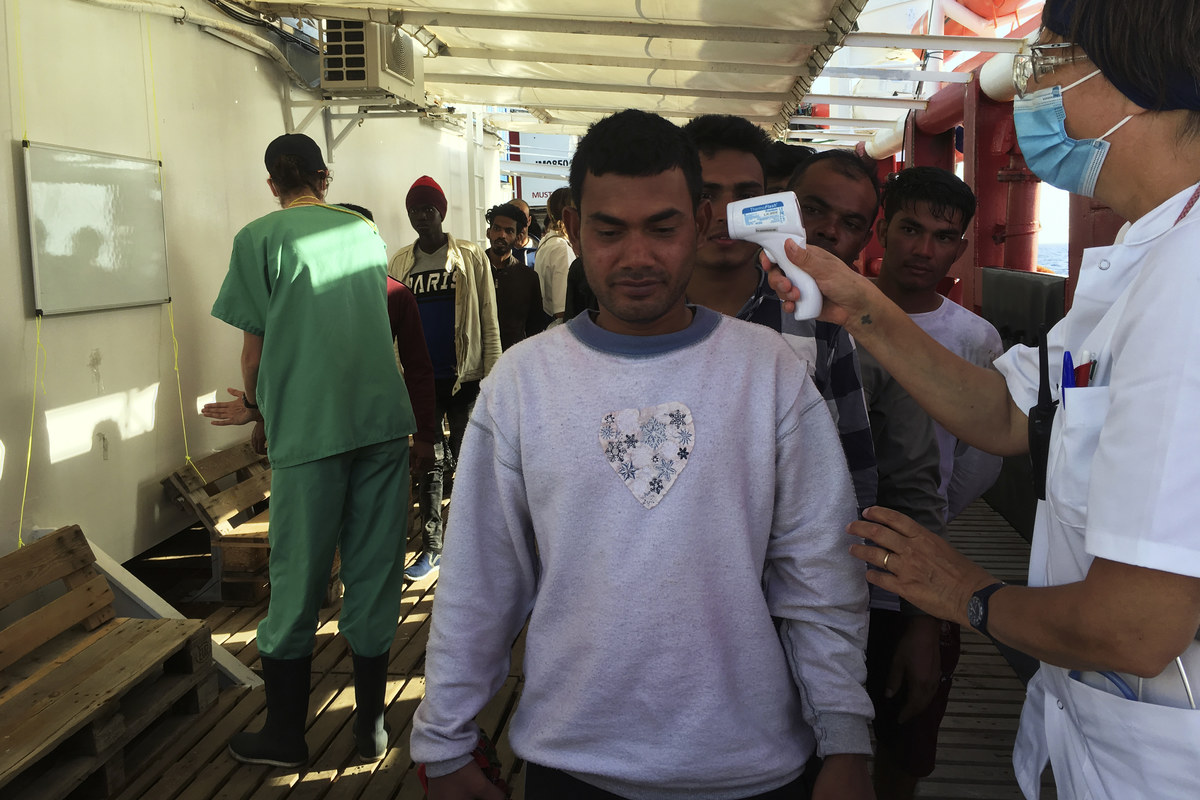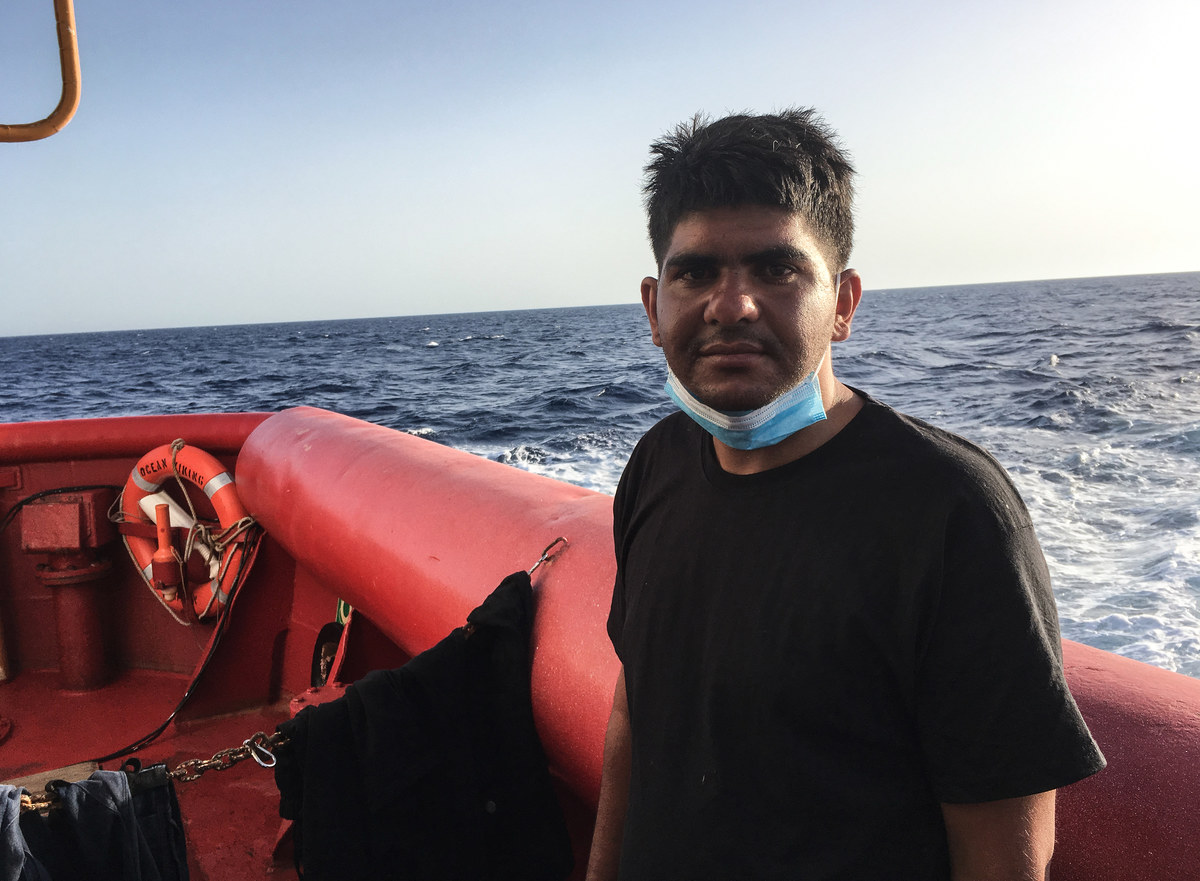ABOARD OCEAN VIKING: Leaning on the aft deck of the Ocean Viking, the humanitarian ship that picked them up in the Mediterranean on Thursday, a group of Pakistanis look back to watch the Libyan coast receding behind them.
And with it, the nightmare of torture, ill-treatment and kidnappings that they have witnessed or suffered.

A medic takes the temperature of migrants rescued by SOS Mediterranee on June 25, 2020. SOS-Mediterranee rescued 51 people in total, including one woman and five children, mainly of Pakistani and Eritrean nationality. (AFP)
“For them, we are not human beings,” said Imran, one of 31 Pakistanis in the group of 51 migrants whose wooden boat was rescued on Thursday off the Italian island of Lampedusa, during an operation by the SOS Mediterranee ambulance boat.
“All the Pakistanis here (on the boat) were captive during their passage in Libya,” said the 30-year-old bricklayer who left the north African country after a year trapped there.
“We were all kidnapped. We came to work, but all we found was war, torture and extortion."

Imran, one of 31 Pakistanis rescued in the Mediterranean on June 25, 2020, leans against the side of the French NGO SOS Mediterranee boat Ocean Viking. (AFP)
“For blacks, it’s almost the same as for us but with the Bangladeshis, the Pakistanis, they are the ones who suffer the most.”
Like Imran, who passed through Dubai before coming to work in construction near Tripoli, all of them told stories of the beatings and kidnappings. For him, it was “from the airport.”
“I was sold to someone who locked me up,” he said, “There were 35, 40 of us crammed into a room, we were not allowed to go out.
“Then he sold me to someone else who also locked me up. It was like that all the time. I was a slave.”
“They give you just enough to eat so you stay alive, not one more bite,” said Naeem, 35, who managed to “escape” but made the “mistake” of going to the police.
“The police took me back to the kidnappers,” he said. “It was worse. There was not a single person who helped us in Libya. I did not find a single good person in the whole country.”
Mohammad Arshad, dressed in a blue traditional shalwar kameez recounted how he spent two years in the port city of Khoms and explained the mechanics of the ransom note.
“They come in groups,” he said. “They can catch you anywhere, at work, in the street. They blindfold you. They hit you and call your parents, saying ‘If you don’t pay, he’ll die.’“
His father had to find $10,000, a fortune in Pakistan, by going into debt with relatives.
“And if we don’t manage to collect the money, we are hit with the butt of a rifle,” added an emotionless Arslan Ahmid whose beard escapes as a long thread from under his protective mask.
“There are also electric shocks. Or else we will be starved, for days, and if we want to drink, it is water from the toilets.
“The tortures, the sufferings which I lived, I cannot put words on it,” said the 24-year-old.
Leaving Libya in these numbers is unusual for Pakistani nationals.
According to the United Nations High Commissioner for Refugees, Pakistanis don’t even figure in the top 10 in terms of numbers attempting the crossing, the list dominated by the Sudanese, followed by Bangladeshis.
Arslan Ahmid had been in Libya for only seven or eight months when he decided to risk his life by taking the boat from Zouara.
“Here in the Mediterranean, we can die once. In Libya, we die every day,” he said in a low voice, after a long silence.
They preferred to pay $2,000 “maximum” to buy a ticket out of the country, they said.
“We took the boat knowingly. But death, we have already seen it very closely,” said Naeem.
“The sea is dangerous, but it is better to drown than to stay in Libya.”
For Naeem, their rescue by Ocean Viking is offering them “a second life” in Europe.
“This is the happiest day of my life,” said 40-year-old Mudassar Ghalib.
They all ask for confirmation that the boat will not bring them back to Libya. Reassured, they begin to dream of where this “second life” might play out. In Malta? In Italy or in France?
“In fact, it doesn’t matter,” said Imran. “I am sure that in Europe, no one will torture us.”
















